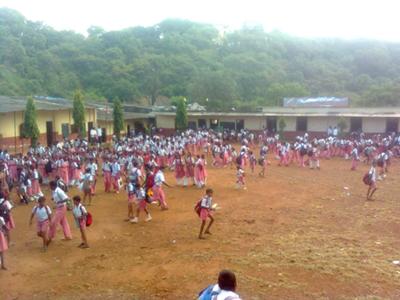
Custom Search
Beyond Boundaries: The World of Children
by Sneha Subramanian Kanta
(Mumbai, India)
Each one of us I am sure encounters a ‘turning point’ in life at sometime or the other. A turning point need not essentially an incident that changes one’s life drastically, but it could also sometimes mean that you get to learn something additional from life.
Recently, I joined an NGO (Non governmental organization) which works for the development of so called under privileged children by teaching them conversational English. Why I used the words ‘so called’ for the children being referred to as under privileged is because they are nothing less than the other children, barring their socio economic status. Although this may sound idealistic and philosophical to some, I want to share some of my experiences with the children.
We were teaching students of class 8 and 9 studying in municipal vernacular medium schools. Right since my eleventh standard, I am into working with NGO’s, especially the ones which work for children. Now, we had to go to a specific school allotted to us, most of which ran in the evenings and I still remember rushing from my workplace to here.
Some of the conversations I’ve had with students here is heart rendering. There was a student in my class, who was very quiet and non-participative. While I returned home, I used to be immersed in deep thought as to what was troubling her. As a teacher, I could sense that the entire class was eager and enthusiastic about learning English, and they participated as much as they could. Except her. Not that our teaching methods were rigid and conventional; on the contrary, we spoke for hardly 5 minutes and since it was an English speaking class, the students had to speak. One day when I intervened and asked another student of mine what was wrong with the girl, she told me that she had a traumatic childhood experience.
Apparently, her mother ran left the house when she was a young girl because her mother-in-law tried burning her when she gave birth to a girl (now my student). Her father soon remarried and now doesn’t talk to the girl. She now stays with her mother’s parents; her mother is still untraced. Slowly, I started being friends with my student and spent time after class with her. One day, I took her to the nearby vada pav stall and had an intimate conversation with her. The first day she did not speak much except occasional smiles. On the fifth day or so, she became very expressive about her feelings and brought paintings for me; almost everyday. I was happy to get them, but studying a little bit of psychology as a keen interest, I could interpret what she had drawn. She had drawn a house and written ‘MY HOME’ on the top of it and made a girl standing near the window which almost looked like a huge jail. I could understand her sense of trap and her inability to confide her feelings to anyone.
Apart from this, I also got the opportunity to travel to the outskirts of Mumbai to a district called Raigad, and went to two villages there called Tara and Shivkar. Interacting with many students there gave me a new experience. Although they were cut off from the city, they weren’t any less confident. The school was run by some rural development club.
My students meanwhile got a better rapport with me. I used some lectures to talk to them and share food recipes, et all. It was interesting to know all that they cooked, which was not very different from what I did.
This experience was a turning point in my life in the sense that I understood that sometimes the world of children is far more adult and more mature than that of grown ups. Although I had my issues with the NGO and am no longer a part of it, my students are still in touch with me.
With them, I’ve understood that there are no boundaries and that they are all, on the surface level created by us human beings. I’d suggest all readers to go and spend sometime in the world of children, it feels wonderful. Besides, you always learn a lesson or two from them!
Comments for Beyond Boundaries: The World of Children
|
||
|
||
|
||
|
||
|
||








